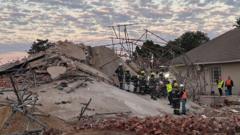David Lochridge's insights into safety lapses highlight systemic failures from both Oceangate and regulatory bodies, providing a multifaceted view of the incident.
**Whistleblower David Lochridge Claims Titan Disaster Was Preventable**

**Whistleblower David Lochridge Claims Titan Disaster Was Preventable**
A former Oceangate employee speaks out about safety concerns leading to the Titan submersible tragedy.
In the aftermath of the Titan submersible disaster during a dive to the Titanic wreck in June 2023, former Oceangate director David Lochridge has come forward, asserting that safety negligence was rampant and that many were "sold a lie." Lochridge, who was dismissed by Oceangate in 2018 for raising safety alarms, had hoped for a different outcome for the five individuals, including Oceangate's CEO Stockton Rush.
The U.S. Coast Guard's investigation pointed to significant safety, testing, and maintenance failures at Oceangate as leading causes of the fatal incident. Lochridge believes there were countless aspects that could have been approached differently, from design to operations. He contends that both the company and regulatory authorities failed to act adequately on his earlier warnings.
Lochridge brought years of maritime experience to Oceangate when he joined the company in 2011. He initially was optimistic about their project to build the Titan, especially since they had partnered with the University of Washington for its design. However, by 2016, he became concerned as the company decided to shift development in-house, stripping away the independent oversight he deemed critical for safety, particularly given the risks presented by the experimental carbon fiber hull.
By 2018, as construction issues began to emerge—visible defects in the hull, and unapproved designs for the viewport—Lochridge voiced his concerns but faced corporate resistance. Following a lengthy back-and-forth over the safety of Titan, he was ultimately fired after presenting a documented report to the board.
Undeterred, Lochridge contacted the Occupational Safety and Health Administration (OSHA) for support, receiving assurance of whistleblower protection. However, after Oceangate retaliated through legal threats, Lochridge ultimately dropped his case, citing exhaustion from the professional and personal toll the situation imposed. He attributes the legal retreat to a systematic “beating down” by the company.
The U.S. Coast Guard's subsequent hearings acknowledged that had OSHA acted more quickly, the tragedy may have been averted. Lochridge criticized OSHA's procedural limits, asserting that their lack of coordination with the Coast Guard allowed for significant safety concerns to go unaddressed. While OSHA stated their role was limited to employment retaliation issues, they also confirmed that the Coast Guard had jurisdiction over safety design concerns.
Both Lochridge’s experience and the Coast Guard’s findings highlight the urgent need for improved communication between regulatory bodies and companies engaged in high-risk endeavors like deep-sea exploration. Following the disaster, Oceangate has ceased operations and pledged cooperation with ongoing investigations into the tragedy that cost five lives, raising questions about the effectiveness of current safety oversight mechanisms.




















